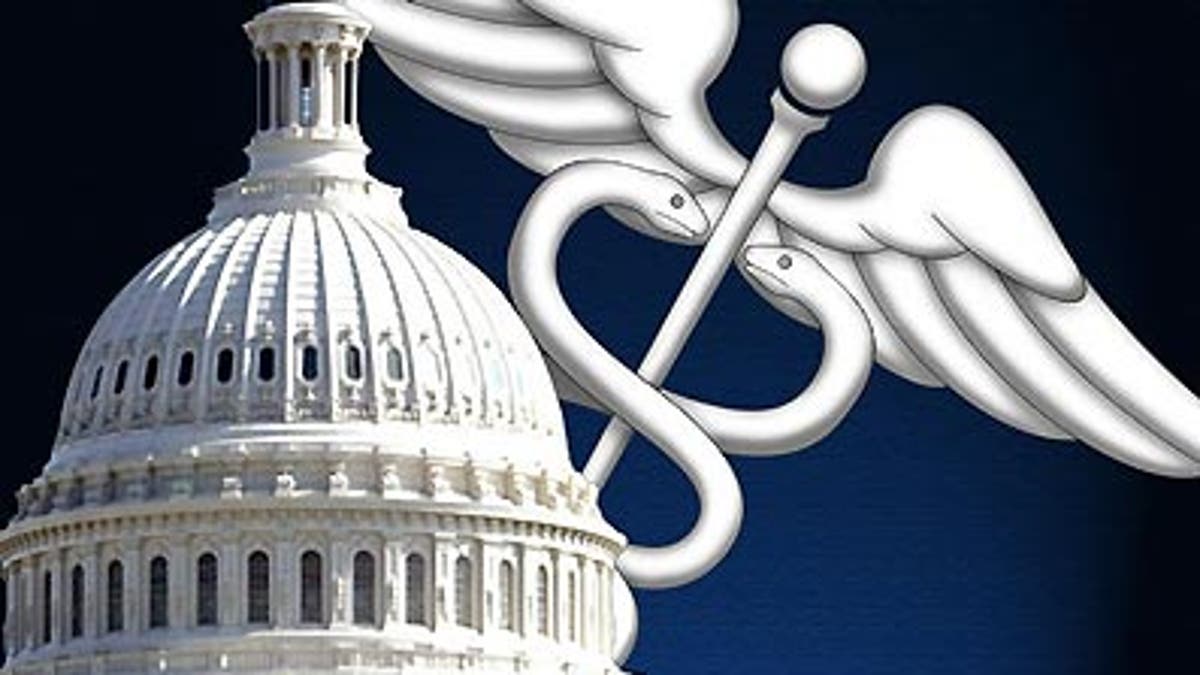
AP
In January I wrote the following piece for the Fox Forum: "Why Doctors are Abandoning Medicare." The primary reason? Washington views the common physician as the enemy—as purely mercenary. Given this, lawmakers should not be surprised that recent surveys suggest nearly one doctor in three—one third of all physicians—would consider leaving medicine if the proposed health care legislation passed. Now that the health care bill is law, the question becomes, how will these physicians escape?
This past year Americans witnessed countless discussions about health care reform. Yet no one even tacitly addressed the elephant in the room—the burden of unnecessary overhead costs.
Trapped under mountains of paperwork and handcuffed to inefficient billing and collection systems, the average medical practice must hire four support staff for every working physician. Bloated regulation and abusive government oversight threaten to compound this problem. In order to squeeze $500 billion out of Medicare spending, Washington will now target working physicians for alleged “fraud” (see "Why Doctors are Abandoning Medicare").
To avoid running afoul of the ever-changing and byzantine Medicare guidelines, physician practices spend tens to hundreds of thousands of dollars on mechanisms to review their documentation and billing; hospitals hire non-medical staff to ensure charts contain the right words for Medicare compliance. The American health care system drowns in a sea of red tape.
Overhead now consumes 60% of the average physician’s collections. Because physicians only collect 60% of what they charge, this means they keep less than twenty-five cents of every dollar they bill. In other words, 75% of patient charges support system inefficiencies—not face-to-face time with the physician.
What if physicians could rid themselves of the lengthy chart reviews and painful court battles to defend themselves against abusive government audits? What if physicians actually had time to talk with patients and the freedom to use their best judgment rather than spend their time perfecting their documentation and getting permission to order a necessary test or use an effective drug?
What if physicians could avoid the hundreds of thousands of dollars of software needed to make sure their electronic charts matched the most recent iteration of the arcane Medicare guidelines?
What if they didn’t have to hire billing and collection experts to fight the government and insurance companies to get reimbursed? What if physicians actually posted what they charged and got paid what they posted?
In short, what would happen if patients and their physician were really the only two parties sitting in the room? If this happened, medical care would cost far less and physicians could devote their energy to patient care, not to fighting an inefficient system.
What if I told you, some physicians can and a growing number do?
More and more primary care physicians, and some specialists, are moving their practices toward a truly free market model. By not signing contracts with Medicare, Medicaid, or insurance companies, physicians are freed to practice as they choose. By ridding themselves of massive regulatory nightmare that comes with such contracts, they can provide care at a fraction of the cost even as they spend more time with each patient.
For example, take Dr. Brian Forrest, a family practice physician in North Carolina. He signed no contracts with traditional insurance companies, Medicare, or Medicaid. Instead he has chosen to run a completely fee-for-service, pay-at-the-door practice. Guess what happened?
Rather than hiring four support staff for every provider, he has three providers and one support staff. Rather than collecting 60% of his billing and putting 60% of his collections toward overhead, he collects 99% of his billing and only pays 25% of this in overhead. Rather than needing to see 20 patients a day just to cover expenses, Dr. Forrest breaks even after the first four. This allows him to have 45-minute office visits earning him the designation of one of 26 Cardiovascular Centers of Excellence in the U.S.
Can the patient and the physician remain at the center of American medicine? Yes, if the government does not legislate the independent, Hippocratic physician out of practice. The practice model Dr. Forrest and his patients enjoy works best when combined with low cost/high deductible plans coupled with a Health Care Savings Account—something the recently passed legislation may soon destroy.
Next week, Physicians for Reform will launch a nationwide Physician Petition in its fight to preserve patient-centered health care. First, we must defund the 16,000 IRS agents assigned to enforce the current health care legislation. Second, we must repeal the current law. Finally, we must we must replace it with fiscally responsible reform.
The time has come when some physicians must close their doors to Medicare, Medicaid, and the entire insurance industry in order to ensure that the patient will remain at the center of American health care.
C. L. Gray, M.D. is President, Physicians for Reform. For more, visit www.PhysiciansForReform.org. Brian Forrest, M.D. is the author of "Breaking Even on Four Patients Per Day."








































